Jennifer WoodBethel Haven Counseling Student Intern  Have you ever thought about the truth of the Bible? We can often be hurt by the words or actions of others, even by our own internal dialogue. But the truth of God’s word is this: God loves you no matter what. Sometimes, even the words “He died for you” can sound cliche’. We can get so deep into our own struggles that we can’t hear the truth. The truth is Jesus was chosen over an assassin to be crucified. So, we no longer have to live in fear, worry, anxiety, or doubt. If you’ve been hurt by words the world says about you, remember that internal power within you to fight back. The truth of God’s word is the opposite of what the world tells us or even what we sometimes tell ourselves. Our own internal dialogue can be brutal. During a recent episode of the “The Chosen” (a series about the early followers of Jesus), the people who were following Jesus were having a meal together. During that meal, they were talking about all the struggles and opposition they had faced since they began following Jesus. They accused one of the women at the dinner of just being kind and good around Jesus. Her reply was spot on. She said, “I can’t be kind FOR Jesus, I have to be WITH Jesus to be kind.” Her response is profoundly true for all of us. Without Jesus, any one of us can fall prey to the patterns of this world. Anyone of us at any time can be a mess without Jesus. But, WITH Jesus, all of us have the power to stand against guilt, shame, insecurity, fear, and doubt. When we stop believing the lies of this world, they no longer have any power over us. We have the ability to choose who we listen to. Who are you listening to? Trusting the truth of God’s love for us is the first step. If you are looking for someone to help you walk through life, talking to a counselor may be an important step in your journey. A thief has only one thing in mind-he wants to steal, slaughter, and destroy. But I have come to give you everything in abundance, more than you expect-life in its fullness until you overflow. John 10:10 The Passion Translation
0 Comments
Elizabeth Thacker, M.Ed., APCBethel Haven Counselor Have you ever gotten anxious, scared, or stressed about something and noticed that your heart rate has gone up? That’s a natural response that our bodies have to stressful or frightening situations. By increasing your heart rate, your body is preparing for “fight or flight,” the urge to fight back or run away from the scary stimulus. Your heart pumps more oxygenated blood to the rest of your body to prepare for action.
Unfortunately, our bodies can’t distinguish between the stress of being attacked by a bear and the stress of giving a presentation, and we experience the same kind of response in both situations. Your body prepares for fight or flight even in events that don’t require that kind of response, and that’s part of why anxiety can be so frustrating. When your brain sends the signal to your body that you are in danger, whether it’s physical danger or just the danger of being in an uncomfortable situation, our bodies respond by increasing both our heart rate and our breathing rate. However, something you may not know is that the connection goes both ways and we can get our body to send signals back to our brain, as well. There’s a good reason why we’re often told to take deep breaths when we are anxious or upset. In the same way that our heart rate increases when we take quick, shallow breaths, we can decrease our heart rate by taking slow, deep breaths. When our breathing slows and our heart rate slows, this sends a signal back to our brain that we are not in danger and it allows us to calm down both physically and mentally. There are many different methods for deep breathing, but my personal favorite is the 4-7-8 method. You inhale for 4 seconds, hold your breath for 7 seconds, and exhale for 8 seconds, and repeat multiple times. The important part is that you are exhaling for longer than you are inhaling. This is because when we inhale, we are taking new oxygen into our bodies that our heart wants to get out into our bloodstream, thus quickening our heart rate. When we exhale, our heart rate slows, so repeatedly exhaling longer than inhaling slows your heart rate overall. Take a moment to try this out right now. Take note of how you are feeling before you begin. Then, repeat the 4-7-8 cycle at least five times. Finally, take note of how you feel after you have completed the deep breathing exercise. What differences do you notice? When I practice this, I often notice that both my body and brain feel calmer. By practicing this deep breathing, you are sending a signal back to your brain that you are safe and you don’t need to access your “fight or flight mode.” This can bring you back to a calmer state where you feel more capable of handling the task in front of you. The most effective way to use this technique is to practice it regularly, multiple times a day, even when you aren’t feeling anxious or scared. This practice will make it easier to call upon the exercise when you find that you are in need of it! If you’d like, take a moment to comment and tell us how you felt after practicing this exercise and how you feel it could be useful for you! Jennifer Wood, Counseling Student Intern We live in a world where it is common to want what other people have. “If I just had this or that, then I would be happy.” True happiness comes from being content with where we are in life and what we already have, both the tangible and the intangible. Christine Caine calls this our “life-print.” In her book, Unshakeable, she talks about how God made each of us unique for a reason:
“It is no coincidence God gave each of us a distinct set of markings unique to every person: our fingerprints. I believe this is one of the ways God reminds us that each of us is an original, unique person with a unique purpose. Psalm 139 says: ‘You know me inside and out, you know every bone in my body; you know exactly how I was made, bit by bit, how I was sculpted from nothing into something. Like an open book, you watched me grow from conception to birth; all the stages of my life were spread out before you, the days of my life all prepared before I’d even lived one day.’ (V.14-16 The Message) I love that! Just as God gave us fingerprints, He prepared for each of us a “life-print” that is completely our own. Sadly, many women never truly discover there’s a divine ‘life-print’ for them because they’re too busy trying to fit into someone else’s. If you feel the urge to become a carbon copy of the wonderful women you see around you, let me remind you: she’s got her life-print, and you’ve got yours. Yours was made for you! So seek God for your purpose, and accept it-because you were “marvelously made.” Men, as well as women, have their own life prints. Discovering and growing into that life print is a beautiful process, one that counseling can help you with. “Body and soul, I am marvelously made! I worship in adoration-what a creation!” Psalm 139:13 The Message Does it make you weak to be vulnerable with yourself and others?
So often, we are scared to be vulnerable with those in our lives that are important to us. Dr. Brene Brown, PhD and LMSW, who has done extensive research on vulnerability, courage, and shame in people’s lives, says, “Vulnerability is the birthplace of connection and the path to feeling worthiness.” Why are we so afraid of vulnerability and being our authentic selves to those we love and in therapy? So often, shame is a cloud that follows us and disconnects us from those we love. The Lord gave us others so we can connect, as it is “not good for man to be alone.” We are MADE for connection… look at our families, our communities, our society. The power of vulnerability and connecting with others is so important for our mental and physical health! 2 Corinthians 12:9-10 says this: But he said to me, “My grace is sufficient for you, for my power is made perfect in weakness.” Therefore I will boast all the more gladly of my weaknesses, so that the power of Christ may rest upon me. For the sake of Christ, then, I am content with weaknesses, insults, hardships, persecutions, and calamities. For when I am weak, then I am strong. The Lord wants us to feel the power and strength in being vulnerable in this life with those we love and trust, our counselors, and Him. This power of vulnerability leads us to a more fulfilling life by freeing ourselves from the weight we carry and releasing it to the Lord. Unfortunately, society has taught us to be strong is to be tough and not show our emotions. This is not true! Even Jesus wept to our God in His most vulnerable state. When we stop ourselves from being vulnerable, we close ourselves off from true intimacy and connection with others, leading to the purest form of love. Vulnerability is showing others our truest selves, honest, brave, and free. It tells the other person, “Here I am in all my glory, frayed edges and all!” and it allows the other person to accept you as you are, hold space for your truth, and say “I am here with you”. Being vulnerable is the bravest thing we can do for ourselves and with our relationships with others. Brene Brown found in her research that those who felt they were worthy of connection experienced greater connectedness to others. Those who felt they weren’t worthy of connection felt greater senses of loneliness. Those who were okay with being vulnerable were able to take greater risks in their personal relationships, less afraid of the fall. Being vulnerable is not oversharing details of your life with random people who you don’t trust yet. It’s not a guarantee that when you take risks you won’t fall. Vulnerability is mainly about finding those who are deserving of your trust and then taking that leap of faith to trust them and share yourself with them. Ultimately, you can be vulnerable by being courageous and leading with your heart. Bonus- you can work on this in a judgment-free zone in counseling sessions to practice. You've heard us say it before - the holidays can be stressful and taxing on your mental health! We've got some quick tips for you that may help you enjoy the season a little more... Recharge - Take care of your physical health. Drink water, move your body, eat enjoyable and nutritious foods, stretch - whatever self-care looks like for you, do it! Unplug - Let's be real, social media is often a breeding ground for comparison. Are you finding it difficult to see other people's "perfect" holiday pictures, Christmas decor, etc. without comparing yourself/your life to theirs? It may be time to unplug and notice the good things you have going on around you. Retreat - When possible, take some time to be alone or just with your close loved ones (this one may not be too hard this year with social distancing and all...). Be intentional to slow down and be still. Read a book, listen to music, enjoy some coffee. But be still. Give - You may have read that and thought - "Give? I'm already giving a lot this season!" We're not talking about the kind of giving where you buy presents and give them. We're also not talking about the kind of giving where you give of yourself (time, service, energy) to others. We're talking about 1 Peter 5:7 kind of giving... "Give all your worries and cares to God, for he cares about you." (1 Peter 5:7, NLT) Give your worries, your fears, your pain, your disappointment, your stress, whatever is weighing you down to the Lord. Choose to trust Him with it this holiday season.
And of course, if you find yourself needing extra support, Bethel Haven is here for you! Sometimes life feels like it's too much to handle on our own. Our professional counselors are trained to help you walk through tough seasons toward hope and healing. To learn more, give us a call at (706) 310-9046!  As the holidays are upon us, it is important to acknowledge that while many enjoy this festive season, it comes with heavy burdens for many others. There are a number of different reasons why the holidays are challenging for many people. For some, it might feel like there’s a lot of pressure to perform this month. You have to get the perfect gift, cook the perfect meal, and find the perfect tree. Depending on where you work, your job responsibilities may intensify this time of year. These things can be overwhelming on top of the day-to-day stresses we experience. For others, the holidays may bring up memories of loved ones that have been lost. Grief can show up more strongly during the holiday season as it is typically a time spent with family and friends. The loss can feel stronger than it does at other times of the year because the traditions we participate in are often associated with those we care about and can be painful reminders that they are no longer with us. Other people hate the holidays because they are estranged from their families. Many have been rejected by family or friends due to their beliefs or their identities, and having “family togetherness” rubbed in their face can sting. Another reason why the holidays may be challenging is that seasonal depression can begin to kick-in about this time. Temperatures decrease, the sun shows itself less frequently, and we begin to feel less connected. On top of these reasons the holidays are hard, the global COVID-19 pandemic presents a unique challenge in that it prevents us from being in close proximity with the family and friends with whom we would typically be gathering. A different kind of grief may be occurring here, one that tells us we shouldn’t still be in this situation, that the pandemic shouldn’t still be affecting us. But it is, and we make sacrifices out of caution and care for ourselves and our loved ones. If the holidays are difficult for you, for whatever reason, I would hope you know that you are not alone. Your grief, sadness, and hurt are all valid and you do not have to fake it. You are not a “Grinch” or a “Scrooge” for having a hard time right now. You are allowed to interact with the holiday season in the way that is healthiest for you. You don’t have to make any changes if you don’t want to, but if you’re looking for suggestions for how to approach the holidays, setting boundaries with yourself and others is a good place to start. This may look like saying no to gatherings of people. It may look to stepping back from the responsibility of cooking the Christmas meal. Take some time to think about what is important for you in the coming weeks and what you might need to get there. When it comes to grief, finding a way to honor what was lost can help with the healing process. You can light a candle in memory, or set an extra place setting at the table for those who won’t be with you. Finally, if you need support this season, reach out for it. Find the people in your life you can openly discuss your struggles with and let them in. You may find that there are more people having a hard time right now than you think. For more information and suggestions check out the following link: https://www.psychologytoday.com/us/blog/lifetime-connections/201912/not-everyone-enjoys-the-holidays 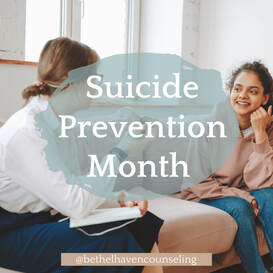 September is National Suicide Prevention Month, so let’s take some time to talk about suicide. I have recently seen many valuable conversations surrounding the idea that National Suicide Prevention Month should not be limited to “check in with your friends,” and I strongly agree with that. There are many systemic issues that lead to suicide and in order to truly “prevent” suicide, they need to be addressed. These issues include but are not limited to:
This blog post is about how to help someone who is suicidal, but this conversation cannot be had without acknowledging the larger issues that lead to suicide. I could (and may), write a completely different post about these issues, but please keep them in mind as you think about helping those you care about. When I talk about my job with people outside of the field, I notice that they tend to get uncomfortable when I mention that I work with people who are suicidal. There’s something about that word or idea that people tend to shy away from, or see as “taboo,” but suicidal thoughts are not something to be ashamed of. Suicidal thoughts are more common than you’d think and are a symptom of great inner pain. Our brains are very efficient problem solvers. When presented with a problem, for example, high amounts of stress, our brains work to come up with the quickest and easiest solution to stop that stress. Often, that solution is distracting ourselves with our phones or ignoring the stress, even if that’s not the healthiest response and the stress comes back to bite us later. For someone in deep physical, mental, and/or emotional pain, a solution to stop that pain would be to not exist anymore. Suicidal thoughts can be someone’s way of trying to solve the problem of pain, even if it’s not the solution we would want them to take. There are other options to solve the problem of pain, they can just require more work and do not always have immediate effects. These thoughts are not a sign of weakness or selfishness, but are simply one’s way of trying to manage their hurt. Suicidal thoughts also exist on a spectrum. On one end of the spectrum, someone might be having thoughts like, “I wish I could just sleep forever so I didn’t have to feel this way anymore.” If we keep moving down the spectrum, another thought might be “I want to kill myself so I won’t be experiencing this pain.” On the other end, you might have a thought like, “I am going to kill myself on Saturday night by using those pills I saw in mom’s medicine cabinet.” These thoughts are not a sign of weakness or selfishness, but are simply one’s way of trying to manage their hurt. Now that you’ve read about some of the basics, here are some ways to help or get involved. If you are worried that someone you know might be experiencing suicidal thoughts, there are some things you can look out for. The following list, taken from Suicide Awareness Voices of Education, can be warning signs of suicide:
If you notice someone you love showing some of those warning signs, you might become worried and wonder what to do. The Suicide Prevention Lifeline has some suggestions to help. Let’s talk about these:
If someone expresses that they are actively suicidal (meaning that they tell you they have a plan, they have access to the means to carry out that plan, and they have the intent to carry out that plan), it might be time to seek professional help. Offer to sit with them while calling the National Suicide Prevention Hotline at 1-800-273-8255 or in the state of Georgia, you can call the Georgia Crisis and Access Line at 1-800-715-4225. If more immediate assistance is needed, call Emergency Medical Services and stay with the individual until help arrives. See the end of this post for a more detailed list of suicide crisis lines.
As you are working to care for someone in such deep pain, make sure that you are also being taken care of. Crises are challenging for both those experiencing the crisis as well as those supporting the individual experiencing the crisis. By taking care of yourself, you are able to have the time and energy to devote to your loved ones to show them you care and want them around. Below is a more comprehensive list of national suicide crisis lines (taken from this Wikipedia page):
Elizabeth Thacker, MEd, APCBethel Haven Staff Therapist Self-care is a popular term thrown around these days. I often ask my clients “how are you taking care of yourself?” because if we don’t take care of ourselves, we are going to get burnt out. The popular understanding of self-care includes things like bubble baths, watching movies, or doing some skincare. And these are important and wonderful things to do if you are able but might better be categorized under the idea of “self-comfort.”
I was first introduced to the idea that there is a distinction between “self-care” and “self-comfort” a few months ago while reading Sarah Bessey’s book, Miracles and Other Reasonable Things (I highly recommend all her books, by the way). This book details some of Bessey’s struggles with her faith and her experience recovering from physical injury. At one point in her story, Bessey notes that there is a difference between “self-care” and “self-comfort” and this concept has stuck with me. Bessey’s book led me to investigate this concept a little more. I haven’t talked to anyone recently who hasn’t needed a little more care and comfort, so I wanted to share what I learned about them and when they are most appropriate. One way I can think to illustrate the difference between these two concepts is that self-comfort is a warm bubble bath, while self-care is regular personal hygiene. Self-comfort is often easy and helpful in the moment, but fleeting, while self-care can sometimes be difficult and challenging, but sets us up for healthy practices in the long term. A good analogy would be that self-comfort is what you do when you have hit “E” on your fuel gauge, while self-care is what you do to keep your tank from emptying out in the first place. Self-comfort is reactive, while self-care is proactive. My understanding of self-comfort is self-soothing. When we are stressed or overwhelmed, needing warmth, or a break, self-comfort is a wonderful thing to utilize. Take that break and watch your favorite show. Enjoy that candy you’ve been saving for a while (it’s called comfort food for a reason!). Go for that run to get out your nervous energy. Self-comfort helps us regulate in the moment when things get to be too much. Self-care is what we do to prevent us from getting overwhelmed as often or as extremely. These things can look like practicing mindfulness, making sure you are eating enough every day, setting up a proper sleep routine, budgeting, getting outside and moving your body, going to therapy, unplugging from social media, etc. When these kinds of things become a regular practice, you will be better able to handle when things become overwhelming and stressful because your tank is fuller than if you hadn’t been taking care of yourself. Self-care and self-comfort are both important and necessary at times. It’s not that one is harmful and one is healthy, but determining which is appropriate is important. Below is an incomplete list of suggestions that can help you get started on your way towards proper self-comfort and self-care. Self-comfort - things you can do when feeling overwhelmed
Self-care - things you can do regularly to help prevent being overwhelmed as often
If you want to learn more about how to better take care of yourself, therapy can be a great place to start. A counselor can help you find what works for you and encourage you to make the changes you have been wanting to make. 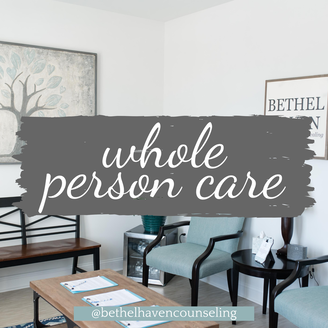 If you’ve been following along on our social media over the last couple of weeks, you know that we have been sharing about who we are - our mission, our purpose, and our values. Part of our Purpose statement reads: We strive to address the needs of the whole person recognizing the biological, social, psychological, and spiritual components which make up an individual… To sum this up - at Bethel Haven we look at our clients through a holistic lens. We believe (along with many in the mental health profession) that mental health cannot be separated from other parts of an individual. The biological, social, psychological, and spiritual parts of us are all interconnected and therefore they impact one another. We believe that ignoring this important concept would be a disservice to our clients!
So what do we mean when we say that we consider all of these factors when working with clients? Well, from the very beginning of therapy, we like to assess functioning in each of these areas. Our therapists ask questions like: Is there a history of mental illness in your family? (Biological) How would you describe your friendships? (Social) What are your strengths? Your weaknesses? (Psychological) Do you have spiritual and/or religious beliefs? If so, what does this look like in your life? (Spiritual) Describe your marriage. (Social) Do you have any medical problems? (Biological) How would you describe yourself? (Psychological) Looking at each of these parts of our clients helps us see our clients concerns in a more comprehensive way and aids us in planning treatment. We want to serve every client well and this approach helps us ensure we are giving our community the highest level of care. Have you been considering therapy? Give us a call to see if Bethel Haven is a good fit for you! 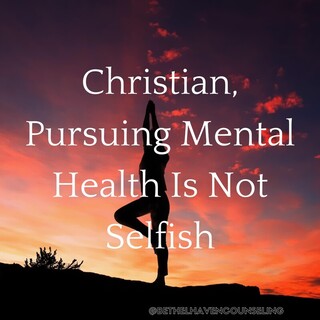 If you are a Christian, you have undoubtedly heard that a key part of following Jesus and honoring God is rejecting selfishness and embracing the joy of serving and loving others. These are fundamental, Scripture-based truths of the Christian walk and are part of “putting on Christ” (Romans 13:14). However, there are many Christians who think that focusing on the self in any capacity, including personal mental health, is a form of selfishness. Rejecting the sin of selfishness and opening ourselves up to true service and love is a beautiful, freeing, and God-honoring process, so please do not hear me say that we should not be fighting this particular sin. My goal in this article is to suggest that caring for yourself (in a way that honors God) is not selfish and that living selflessly does not mean you have to neglect your mental well-being. It seems like in the Christian community, we focus on fighting the sin of selfishness but we neglect to clarify a very important fact: not all time spent working on and focusing on the self is selfish. Consider the following verse: “Do nothing from selfish ambition or conceit, but in humility count others more significant than yourselves. Let each of you look not only to his own interests, but also to the interests of others” (Philippians 2:3-4, ESV). It is easy to look at this verse and glean that we are to only look out for others, but something we often miss is that first phrase - “Let each of you not look not only to his own interests…”. These words imply that we are to be caring for ourselves as well as others. Let’s also consider the second greatest commandment - “You shall love your neighbor as yourself”. This command can originally be found in the Old Testament, but Jesus reiterates it here in Matthew 22 when he is asked which commandment is the greatest. As you may remember, He replies that the greatest commandment is to love God, and the second is to love others. And, how does He say we should love others? As we love ourselves. I have talked to believers who say that they feel like it’s sinful for them to focus on their own “stuff” (be it emotions, thoughts, struggles, past experiences, etc.) and that they need to instead look outside of themselves and just focus on serving others. (Again, I am not saying these are bad things to do). However, what often happens is they neglect their mental, spiritual, physical, and emotional needs and run themselves ragged trying to meet everyone else’s needs. Service and care of others becomes a chore, another thing on the “to-do list”, rather than something born of genuine love and goodwill. The point I am trying to make is that you can’t pour water from an empty pitcher. If you are “empty” due to issues such as unaddressed mental illness, unchecked emotions, undealt with relational wounds, or whatever it may be, your ability to love your neighbor will be hindered. This is where looking to our own interests and biblically loving ourselves comes into play. I believe that biblically loving ourselves means that we agree with God on who He says we are, and we treat ourselves in a way that honors Him and reflects His care for us. And when we do so, we are able to extend the same to others. So, Christian, pursuing your mental health is not selfish. It honors that Lord when we agree with Him and walk into the healing that He so freely offers us. This increases our capacity to love Him and love others, filling up our pitchers so that we can pour into our family, friends, and community in a way that spreads the hope of Christ. |
Bethel HavenWritten by our counselors to help promote your help, hope, healing Archives
June 2021
Categories |

1622 Mars Hill Road Suite A Watkinsville, GA 30677
P: 706-310-9046
[email protected]
Bethel Haven, Inc.
Copyright © 2016
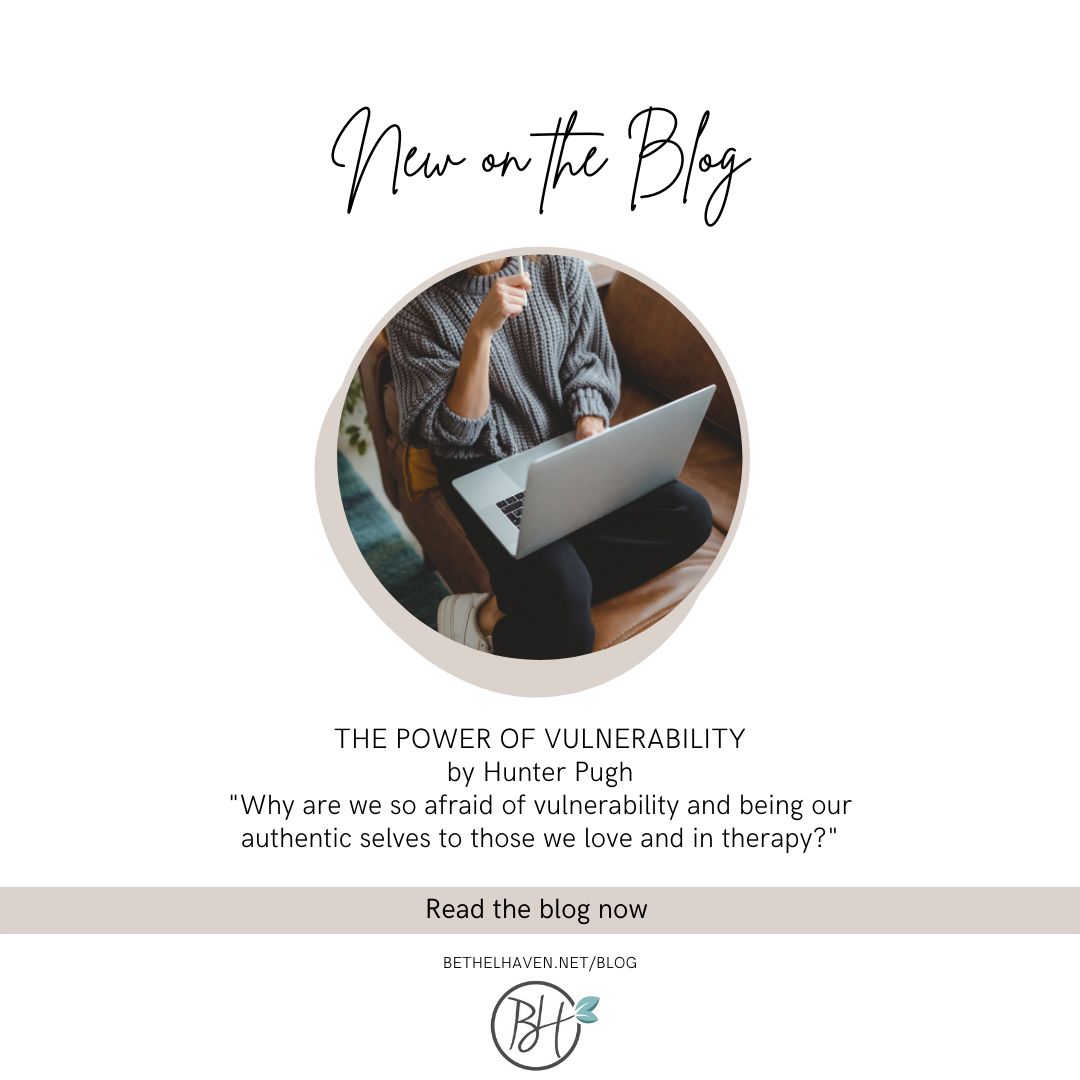
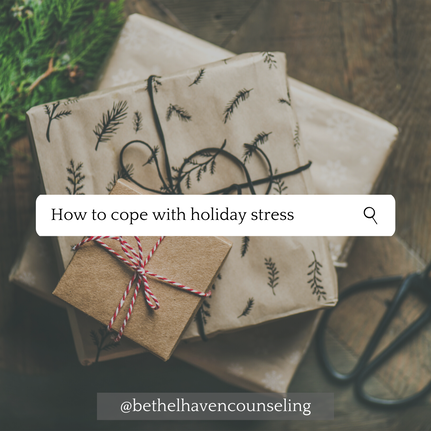
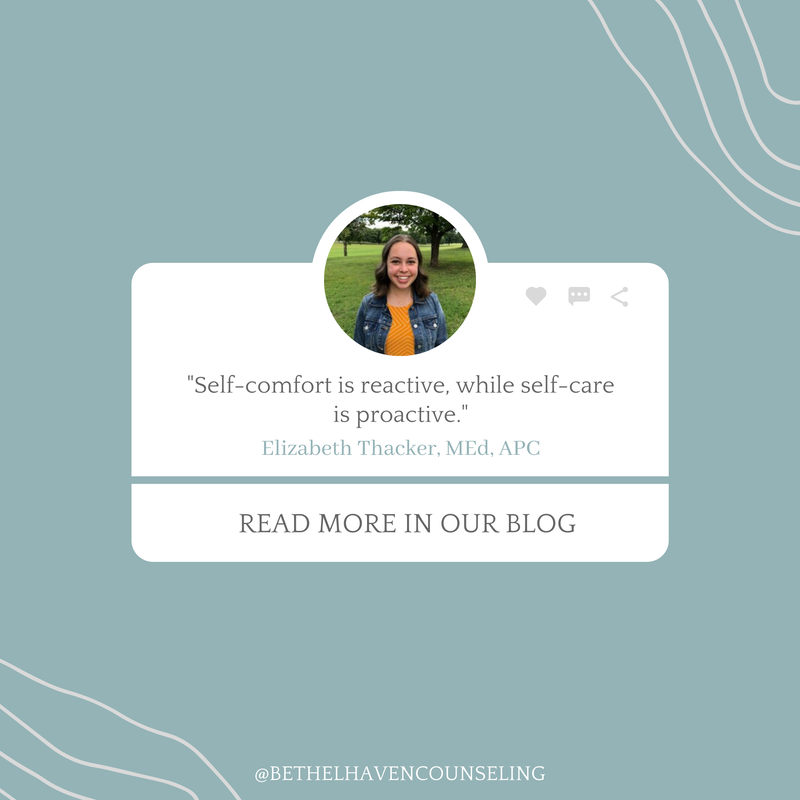
 RSS Feed
RSS Feed
